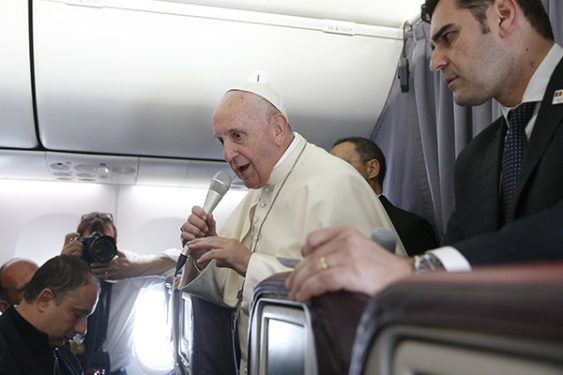
By Inés San Martín
ROME (Crux) – According to Pope Francis, the world today is living in an era of changes where “the soul of our peoples is at stake.” On June 4, he called for the defense of social rights, saying that they’re not outdated but still contribute much to society.
“There is no democracy with hunger, nor development with poverty, nor justice in inequality,” Pope Francis said.
Speaking to a summit of Pan-American judges meeting at the Vatican to discuss the theme “Social Rights and Franciscan Doctrine,” Pope Francis said that he’s concerned that those who see social rights as outdated advance “economic and social policies that lead our peoples to the acceptance and justification of inequality and indignity.”
According to the pontiff, “injustice and the lack of tangible and concrete opportunities” – often hidden or discussed and analyzed without providing solutions – are “also a way to generate violence: Silent, but violence in the end.”
His remarks came at the end of a June 3-4 summit by the Pontifical Academy for Social Sciences, where Argentine Archbishop Marcelo Sanchez Sorondo serves as Chancellor.
The summit brought together judges from Canada to Argentina, and included discussions on how to implement the “three Ts” -Tierra, Techo, Trabajo – (land, housing and work); how to challenge budgetary constraints and external banking or financial controls based on countries’ foreign debt; and how to overcome political pressures and create a worldwide movement based on the unrestricted defense of social rights.
A similar summit took place last year in Buenos Aires with the participation of 300 magistrates. They discussed social rights in the last several papal documents, including the apostolic exhortation Evangelii Gaudium and his ecological encyclical Laudato Si’.
According to the organizers of the conference, “Justice and judges can help us reorganize our social and economic life to uphold the values that create happiness such as contemplation, prayer, equity, fraternity, friendship, trust, environmental sustainability, and peace.”
The theme of happiness, a statement from the academy reads, “must not be separated from that of social justice.”
Pope Francis also thanked those gathered for consolidating the “Permanent Pan American Board of Judges in Defense of Social Rights” that hopes, in the future, to coordinate efforts in the region to optimize judicial policies centered on the full respect of social, economic and cultural rights, promoting training, courses, and committees to defend magistrates under pressure.
The pontiff also said that, when it comes to looking for solutions to the ongoing crisis, the “popular sectors” are called to add their voices to the discussion, as they are “an active part of the face of our communities and nations, and they have the right to participate in the search and construction of inclusive solutions.”
“Much has been said for them, [but] we also need to listen to them and give them a voice in these meetings,” he said. “Such measures will allow us to establish a culture of encounter” because “commitment, true commitment, is born of the love of men and women, of children and the elderly, of peoples and communities… of names and faces which fill our hearts.”
Pope Francis also said that seeing that we live in a world of “virtualities, changes and fragmentation,” social rights cannot be “oratory or nominal appeals, but should be a beacon and compass.”
According to the Argentine pontiff, the challenges the world faces today cannot be solved by “isolated actions or voluntary acts of a person or a country.” Instead, there’s a need for a “new atmosphere,” meaning, “a culture marked by united and courageous leaders who know how to involve other people and groups” that can open paths for future generations, “seeding conditions to overcome the dynamics of exclusion and segregation so that inequity does not have the last word.”
